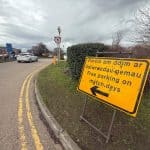Our budget consultation for the 2018/19 financial year has started.
We want you to take part, and to let us know what you think about some key areas.
Read on to find out more.
Why we are where we are
Early in October, the Welsh Government announced its provisional budget settlement, which breaks down how much money will go into public services across Wales.
Under the settlement, Wrexham Council faces a funding cut of 0.6, leaving us with £9m to find in this year’s budget.
We’ve had to make £60m in cuts since the financial crisis of 2007/8, and have already made cuts to a number of services.
As well as looking at this year, we’ve also got next year and the coming years to think of, as our frontline services face changing pressures.
Council Leader Cllr Mark Pritchard, and Chief Executive Ian Bancroft discussed the settlement and where it leaves us in a video, which you can watch by clicking here.
These are cuts we don’t want to have to make. They cover a lot of service areas and we know they’re very important to thousands of people.
But, unless Welsh Government increases the amount of funding to Wrexham Council in its final settlement at the end of December – and we will continue to lobby both Welsh Government and the UK Government for more funds – we don’t have any choice.
We don’t have the choice of doing nothing. Services are going to have to change, and we’re going to have to make cuts.
A BAD DEAL FROM WELSH GOVERNMENT MEANS WE’RE FORCED TO MAKE MORE CUTS. HAVE YOUR SAY…
How does the budget work?
In the current financial year, the total budget is £233m, made up of £175m in Welsh Government funding and £58m in Council Tax.
There are some areas where we legally have to provide a service; things such as social care for adults and children, and schools/education.
And there are costs which we have to pay, such as for waste disposal or housing benefits.
We can make efficiencies and changes in those areas to save money, but we’ll always have to offer them.
So many of the cuts we’ll have to make will come from other areas.
Last year, the consultation looked at a lot of areas across a number of different services, covering things like country parks and the school music service.
But this year, because we’ve already made the changes to the services mentioned above, we’re now having to focus on what people think about a few key, important services.
The key questions we’re asking in the consultation are around:
- Income
- Waste services
- Libraries
- Faith school transport
- and Council Tax.
Other suggestions are, of course, welcome – the consultation will cover every item on the list of savings we have to make, but those are they areas where we have to focus.
No decisions have been made – we need to hear what people have to say before we can make them.
“You won’t listen anyway!”
We know that the choices we’re putting to people won’t be popular ones.
Things like waste collection and Council Tax don’t just affect relatively small clusters of service users – they affect everyone.
And we understand people’s frustration when it comes to consultations and the responses to them.
Since the start of austerity in 2008/9, every organisation has had to go to the public to find out what they think about some of the difficult choices they’ve had to make, as budgets have got increasingly tighter. And as cuts have continued, many feel that they’re not being listened to.
But by not saying anything, or by writing this consultation off, you miss the chance to have your say. Don’t.
As we noted above, these are services that impact on everyone – so the more people that have their say, the better.
“How can I take part?”
To take part in the consultation, just click this link.
Paper copies are also available by request by calling 01978292000.
Cllr Hugh Jones, Lead Member for Communities, Partnerships, Public Protection and Community Safety, said: “As we find ourselves with an unfair provisional settlement from the Welsh Government, and in the tenth year of a continued series of service cuts and changes, we are now having to look at proposed changes to wider, front-line services.
“Every resident in Wrexham could be affected by some of the proposed changes – as such, it’s vital that as many people as possible take part in this consultation.”
[button color=”” size=”large” type=”square_outlined” target=”new” link=”http://www.yourvoicewrexham.net/KMS/elab.aspx?noip=1&CampaignId=766&SessionId=7W3XW8KTF6″]I WANT MY SAY![/button] [button color=”” size=”large” type=”square_outlined” link=”https://news.wrexham.gov.uk”]NO…I DON’T WANT A SAY[/button]









